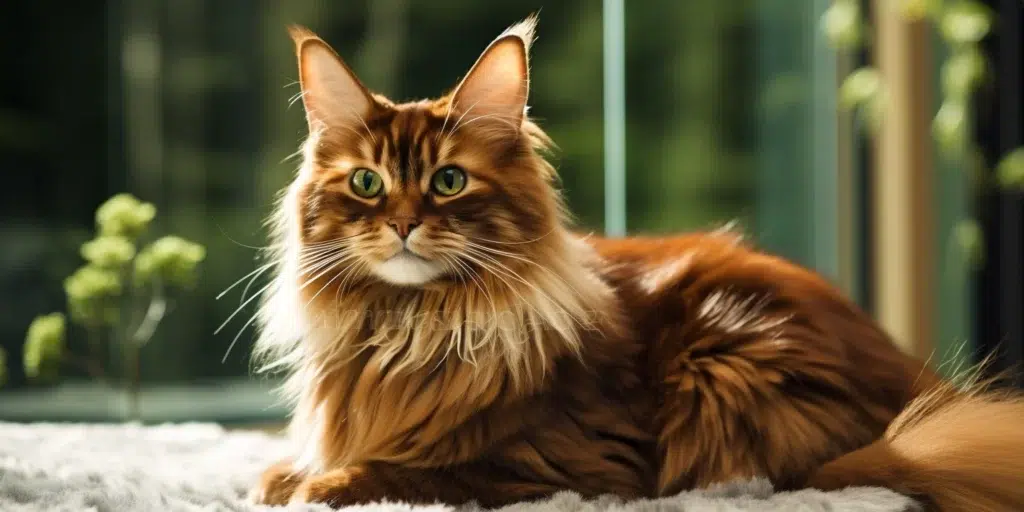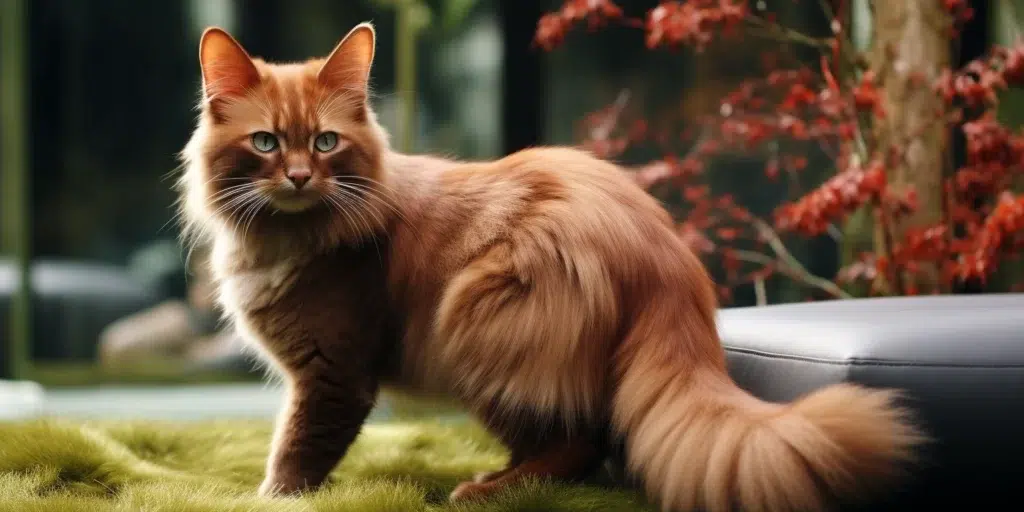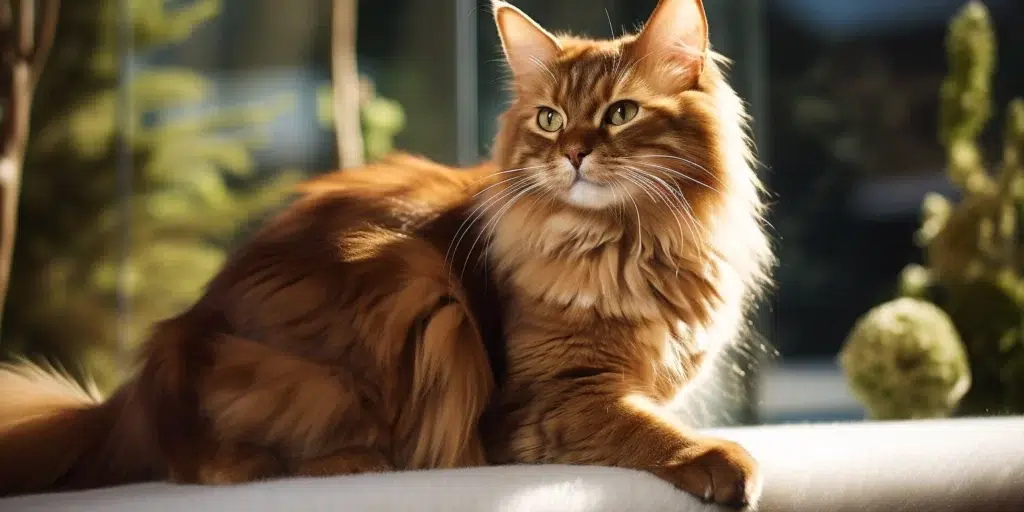Ahh, the Somali cat. With its fox-like tail, shaggy, ticked coat, and ear tufts, it’s not hard to see why this breed is so popular! They are incredibly affectionate cats who require lots of love and attention from their owners.
But don’t let that fool you; they are also very active cats who can keep up with the most energetic family members. Whether it be playing in boxes or zooming around your house, Somalis will always make sure to bring a smile to your face with their goofy antics!
Not only are these cats fun-loving and inquisitive creatures, but they’re also incredibly intelligent. From learning tricks like fetching small items to solving puzzles, the Somali won’t disappoint when it comes to brainy behavior!
As a Somali cat owner, it is important to know the basics and advanced care requirements of this unique breed. With the right knowledge, you can make sure your cat lives a long, fulfilling life! So let’s begin!
Breed Overview

The Somali Cat is a unique and playful breed that originates from the late Victorian era. Originally known as “long-hair Abyssinian,” the Somali Cat was first mentioned in print at the Crystal Palace Cat Show in 1871.
The Somali cat, like its ancestors, the Abyssinian cat, is believed to have originated in the Indian Ocean coastal regions and parts of Southeast Asia. However, it was given its name ‘Somali’ to acknowledge its roots with Abyssinian cat. This is because Somalia has border with Abyssinia (currently Ethiopia).
Back in the 1940s, there was this British breeder named Janet Robertson who decided to take her Abyssinian kittens on a little adventure to Australia, New Zealand, and North America. And guess what? Some of these kitties ended up having long or fuzzy coats!
Back in 1953, something truly captivating happened in North America. It was the arrival of ‘Raby Chuffa of Selene’, a long-haired Abyssinian that turned heads and sparked the interest of breeders. Some breeders were initially surprised by the unexpected variation in their litters, but a handful of adventurous souls embraced the opportunity and continued to breed these fascinating cats.
Fast forward to 1963, when Mary Mailing, a cool breeder from Canada, decided to show off one of these unique cats at a local pet show. And wouldn’t you know it, the judge, Ken McGill, was so impressed that he just had to have one for breeding!
In my opinion, Somalis are fantastic companions for anyone seeking an intelligent feline that loves to engage with their human family. With the right training from a young age, these cats can develop into devoted friends who will always be there for you!
Identifying Somali Cat
The Somali cat is a beautiful and unique breed. With the Agouti ticking producing its iridescent warmth of color, their coat is a sight to behold. Each strand of hair has four to six alternating bands of rich color, much like that of a bunny coat.
The texture of the hair is usually soft, and it can vary depending on the colors because of the different shapes and distributions of pigment particles within the hair shafts. The breed also has a remarkable head type, which is a modified wedge with rounded contours. This profile extends from the bridge of the nose up to the forehead.
What makes them very unique are their large, expressive eyes. Which are almond-shaped jewels surrounded by dark eyeliner. Eyes can be in lighter colors like gold, amber, or green.
Another feature that makes Somali cats stand out from other breeds is their slim yet strong bodies. Medium in length and muscularity, as if they were fine motor-skilled athletes!
Their legs are elegantly elongated and gracefully toned, while they stand on dainty oval-shaped feet, giving them a poised and delicate presence. These cats also come in a captivating array of colors, adding to their allure.

Chocolate Somali can range from light to dark brown depending on the cat’s genetics, while lilac has subtle lavender tones in its fur. There’s no denying that Somali cats have earned themselves a spot among some of today’s most treasured felines!
Personality Traits
Somalis are renowned for their warm and friendly demeanor, as well as their sharp intellect. These feline companions forge deep connections with their human counterparts, exhibiting a keen interest in the world around them.
They have active personalities and are highly interactive with those around them. They love to explore their environment, but rarely will they knock anything off of a shelf or countertop.
You can expect these cats to find themselves on top of refrigerators, doors, bookcases, or anywhere where there is a good view! This breed is a high-energy cat who prefers to be on the move rather than cuddled up in your lap.
Somalis occasionally love to curl up on your lap or sneak under the sheets at night to be close to you. These cats are truly amazing, with the ability to switch from regal and elegant to playful and spirited in an instant!
Their intelligence allows these cats to get out of the way when needed, but they also play with kids when it’s playtime. Somalis are fearless and have been known to befriend other cats, dogs, or large parrots without any issue.
When introducing your Somali cat to other animals, it is vital to do so gradually and in a controlled atmosphere. This will help ensure proper integration among them all. It is preferable to raise all the pets together so they become used to each other from a young age.

Activity Level
Somali cats are highly active and energetic animals. They are known for their curiosity, agility, and athleticism. This makes them ideal pets for those who can keep up with their energy levels.
Somali cats enjoy exploring new environments and playing with toys. They also enjoy running on exercise wheels and climbing cat trees. And like dogs, they love to sit near the window and watch what’s going on outside.
Somalis flourish best when they have people of all ages around them, but with our busy lives, we may not be able to offer them all of the attention they require throughout the day. Having another Somali or a companion with a similar temperament is the best way to keep your cat active!
Somali Cat Loyalty
The Somali cat is known for its active and playful nature, always seeking out new adventures. They have a keen sense of alertness and are constantly on the lookout for interesting things to discover.
In addition to their independent streak, they also enjoy the company of their owners and will often trail behind them throughout the house. And when it is time to relax, they have no qualms about snuggling up on your lap for a cozy nap.
Somalis are known for their remarkable memory. They have the ability to recall the location of objects even after they have been moved. This makes them the ideal feline companions who can easily recognize and bond with their owners and family members.
They can be quite amicable to other cats, but they form stronger bonds with humans than with other pets. If there’s another pet in the home, chances are that your Somali will become fast friends with it! But you will be their best friend for life.

Love Of Water
Somali cats have a fascinating affinity for water. Just like their Abyssinian counterparts, they absolutely adore having access to spacious water bowls or even a delightful fountain to play and splash around in.
In fact, some Somali cats take their love for water to the next level by actively seeking out sources of running water!
To keep your Somali cat entertained, you may want to consider leaving the faucet running for them from time to time. This will not only provide them with an entertaining activity but also give them access to plenty of clean drinking water.
Trainability
Somali cats are intelligent and inquisitive, so it’s easy to train them. They learn best with positive reinforcement techniques. This can be simple petting, verbal praise, or treats.
Somali cats can be taught basic commands like “no,” “come,” and even “fetch” if properly motivated. Similarly, they can also be trained to respond to hand signals or other forms of non-verbal communication.
The key to successful training is consistency and patience. When dealing with a Somali cat, you should immediately reward desired behaviors. You should also avoid punishing undesired behaviors directly.
By rewarding good behavior consistently over time, your Somali will become an obedient companion that follows your commands reliably.
Adult Size
Somali cats are a medium-sized breed, with many adults reaching heights of up to 8–10 inches and weights ranging from 8 to 12 pounds.
They have long legs and muscular bodies that give them an elegant appearance. Their tails are long and tapered, typically reaching the ground when they stand at their full height.
What’s most interesting about this breed is the way it grows at different stages in its life. As kittens, Somalis grow very quickly, increasing their weight by up to 50% in just two months!
Once they reach adulthood, though, their growth rate slows down significantly, only growing up to 10% per year until they become fully mature. This slower growth rate allows them to maintain their slender and athletic physique throughout their lifespan.

Life Expectancy
Somali cats have a life expectancy of 12–14 years, offering them the potential for a long and fulfilling life. But it is important to ensure that your cat receives proper care to enable them to reach their maximum lifespan.
Ensuring your Somali cat lives a long and healthy life starts with providing them with nourishing food and ample playtime. A well-balanced diet is essential to meet all their nutritional needs and promote overall well-being. Regular exercise not only helps prevent obesity but also keeps them mentally stimulated.
Somali Cat Care
Taking care of a Somali cat is crucial for being a responsible owner. Making sure your cat stays clean and healthy is essential for their overall well-being. To start, it is important to regularly brush their coat a few times a week. This helps eliminate any dead hair, prevent tangles, and evenly distribute skin oils throughout their fur.
When spring rolls around and the shedding season begins, it is important to stay on top of brushing your cat’s coat. Daily brushing will help you quickly get rid of any excess fur. And while you are at it, do not forget to give their tails a once-over to make sure there are not any unwanted surprises stuck in their fur. If you do find anything, a gentle wipe with baby wipes should do the trick!
To properly care for this cat, the first step is to establish a regular brushing routine. By brushing their coat a few times per week, you will not only remove any dead hair, but also prevent tangles and evenly distribute skin oils throughout their fur.
Brushing your Somali Cat’s teeth should also be done at least once per week. This is ideal for keeping their breath fresh and preventing dental diseases.
Trimming your cat’s nails every couple of weeks can also help keep them looking neat. It will also prevent scratches on furniture or skin when they jump around or cuddle up.
Wiping down their eyes and ears with damp clothes is also highly recommended. This is to keep any discharge away that could lead to infection or skin problems.
Diet
If you want your Somali cat to stay active and healthy, it is important to give them a diet that is rich in nutrients. Make sure to feed them twice a day to keep their energy levels up and provide them with the necessary nutrition.
A balanced, nutrient-rich cat food should be the base of a Somali’s diet, supplemented with occasional treats. High-calorie foods are also beneficial for these active felines since they will burn more calories than an average housecat.
It’s best that you monitor their weight, as too much or too little food could lead to health problems down the line. Never leave food out all day, as some Somalis may overeat if given the chance.
Try our Cat BMI Calculator to maintain a healthy weight for your cat.
Regular veterinary checkups are crucial for maintaining optimal health in any pet – including Somalis! Routine visits will help identify any potential eating disorders before they become serious problems.

Because this breed is very active, it’s crucial to provide them with plenty of fresh, clean water each day. This cat needs to be hydrated at all times to maintain a healthy lifestyle.
Somali cats may be hesitant to drink if the water bowl is too close to their food, so it’s best to place a few bowls around the house where they are far from the food bowl. Filtered drinking fountains are a great alternative to bowls since they keep the water flowing and encourage your cat to drink more.
If you notice your Somali cat not drinking enough, try adding ice cubes or warm chicken broth into the water bowl. This can encourage them to drink more often. This is especially important on warmer days of the year.
Exercise Requirement
Exercising is crucial for this breed’s overall health and happiness. Not only does physical activity help keep them fit and trim, but it also helps to reduce stress levels.
Regular playtime with toys or interactive games can help satisfy their curiosity and provide mental stimulation. This is just as important as physical exercise for cats of all ages.
Playing with your cat is a great way to keep them occupied and entertained, and it also allows them an opportunity to show off their skills. Some toys that are sure to catch their eye are balls, laser pointers, and twist-ties.
Shedding Levels
Somali cats are known for their beautifully soft and silky coat, which requires combing at least once or twice a week to keep them well-groomed. Somali cats generally shed their thick winter coat in the spring.
Shedding levels in Somali cats can vary depending on the stage of life they are in. In kittens, shedding tends to be at its most frequent as their coat changes from soft baby fur into its adult coat.
During this time, you may find yourself needing to brush your Somali cat more often. It is important to keep loose fur away from the furniture. Fortunately, as these cats mature, their coats become thicker and less prone to shedding when they are not in shedding season.
Overall, having a Somali cat around is great because you won’t have to worry much about their shedding. Just make sure you give them a bit of extra attention when they go through the seasonal transitional phases!
Health Issues
Somali cats are susceptible to certain diseases and conditions. These include early periodontal disease, patellar luxation, amyloidosis, and associated kidney disease. They also are susceptible to progressive retinal atrophy (for which a DNA test is available), and pyruvate kinase deficiency (for which a DNA test is also available).
A knowledgeable breeder should always test for these conditions to ensure the health of the Somali cats they produce. Poor diet and living conditions can have a detrimental effect on Somali cats’ health.
Ensuring your cat receives a well-balanced diet is crucial for their overall health. A lack of essential nutrients like protein, vitamins, minerals, and fatty acids can result in deficiencies that may lead to various disorders and illnesses.
Additionally, providing your cat with a clean and safe living environment is essential to prevent them from being exposed to parasites or bacteria that can cause severe infections.
To prevent diseases and keep these cats healthy, it is best to feed them high-quality cat food with the appropriate balance of nutrients. Regular veterinary visits are also important for the early detection of any health issues.
Buying Tips
- Look for a reputable breeder: As with any pet, it is important to find a reputable and experienced breeder when looking for a Somali cat. Reputable breeders will provide health guarantees and be able to answer questions about the animal’s temperament, medical background, and lineage.
- Check the kitten’s condition: Before purchasing your Somali cat kitten, ensure that it is in good physical health. Its eyes should be clear, ears clean, coat shiny, and free of parasites such as fleas or ticks.
- Make sure the kitten has received the proper socialization: If the breeder properly socialized the kitten with people from a young age, it will be simpler for it to adjust to life with you as its owner in its new home. Ask if the kitten was hand-raised or bottle-fed so you can have an idea of how familiar it is with people before bringing him home.
- Consider spaying or neutering: It is important to consider having your Somali Cat spayed or neutered at an appropriate age; this helps reduce unwanted behavior problems such as spraying urine around your house and reduces their risk of certain cancers later on in life.
- Provide grooming care: The thick double coat of these cats requires regular brushing to prevent mats from forming in the fur; ask your vet or groomer for recommended products suitable for long-haired coats like those seen on Somalis Cats!
You Might Like: 250+ Amazing Somali Cat Names & How To Select One!

Conclusion
If you are looking for a unique and beautiful cat, the Somali Cat is an excellent choice. With its long, fluffy coat and outgoing personality, the Somali Cat is sure to bring joy and companionship into your home.
They are intelligent cats that can learn tricks with proper training. Plus, they have an affectionate nature that makes them great family pets. All in all, the Somali Cat is a wonderful pet to have around!